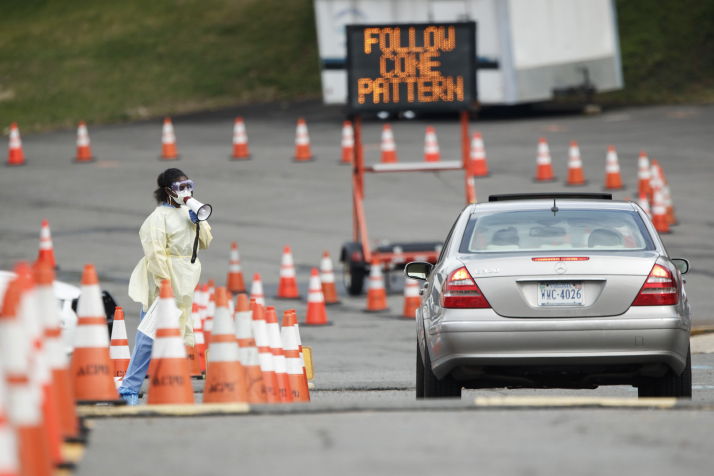| World |
| For a Consensual COVID-19 Reduction Strategy | |
| Cooperation on medical research, trade and among institutions is the only answer | |
|
|
 A Best Buy store in the northern suburbs of Dallas, Texas, U.S., on March 19. The store shortened business hours and limited the number of customers from March 23 as a precaution against the novel coronavirus outbreak (XINHUA)
On March 24, U.S. President Donald Trump asked for medical equipment and test kits in a 23-minute phone call with Moon Jae-in, President of the Republic of Korea (ROK). The call was said to be arranged after an urgent request by Trump. The U.S. president has repeatedly bragged about the U.S. preparedness for the novel coronavirus disease (COVID-19), but the surging confirmed cases and increasing death toll tell another story.
In fact, a week ago on March 16, the U.S. received 50,000 test kits and 1 million masks from the Jack Ma Foundation, the philanthropic organization of Jack Ma, founder of e-commerce giant Alibaba. "All the best to our friends in America," Ma wrote on Twitter. It was a recognition of the generous assistance many U.S. foundations and companies showed to China when it grappled with COVID-19. With the U.S. now facing similar difficulties, Chinese organizations are lending a hand. Virus knows no borders. Cooperation and communication are needed to contribute to the global battle against the pandemic, not the accusations hurled by some politicians and a segment of the U.S. media, who blame China for the crisis. The blame game By March 26, over 65,000 people in the U.S. had tested positive for COVID-19 and more than 920 deaths had been reported. However, just a week earlier, the number of confirmed cases was only about 4,000. According to Robert Redfield, Director of the U.S. Centers for Disease Control and Prevention, the window for fully containing the spread of the coronavirus has passed in some places. The U.S. took a different approach compared with the efforts to contain the virus in many other countries like the ROK and China. At the initial stage of the outbreak, Trump kept downplaying the threat to maintain the level of economic stability. And when the situation exacerbated, he began calling COVID-19 the "Chinese virus" in an attempt to shift the blame to China. Secretary of State Mike Pompeo also joined the chorus of anti-China politicians and media by using "Wuhan virus" and attacked China for "not being transparent" based on some made-up "facts." Chinese Foreign Ministry spokesperson Geng Shuang, rebutted the accusation, saying, "Since January 3, China has been regularly updating the World Health Organization and other countries, the U.S. included." According to a report by the U.S. media The Daily Beast, the White House is forcing several federal agencies to blame China for creating a global pandemic. "Everything is about China. We're being told to try and get this messaging out in any way possible, including press conferences and television appearances," it quoted an unnamed official as saying. Geng also said on February 2, when the U.S. banned entry of foreigners who had visited China in the past 14 days, only about 10 confirmed cases had been reported in the U.S. However, the U.S. wasted the precious time China bought for other countries. "Now the U.S. has nothing better to do than discredit others, deflect responsibilities and find scapegoats." In contrast, countries like Singapore and the ROK have made full use of the window period and taken necessary prevention and control measures.  Medical staff guide a vehicle at a novel coronavirus test point in Arlington, Virginia, the U.S., on March 19 (XINHUA)
Supply chain stable In the past two months, idle factories in China and suspended flights between the two nations led some in the U.S. to view the pandemic as a perfect opportunity to decouple China and the U.S. On January 30, U.S. Commerce Secretary Wilbur Ross said the COVID-19 outbreak in China "will help accelerate the return of jobs to North America," which was met with strong criticism at home and abroad. It is more urgent than ever to facilitate cooperation and communication rather than decoupling and isolation, according to experts at an online seminar hosted by the Center for China and Globalization in Beijing on March 19. "The idea of decoupling is very unrealistic," said Teng Jianqun, Director of the Department of American Studies at the China Institute of International Studies in Beijing. Teng said supply chain links can't be shifted at will. China's position in the global industrial chain, both in the short and long term, remains firm. For instance, China is an important supplier of drugs and medicinal materials worldwide and this role has been strengthened during the pandemic. In terms of manufacturing, China's position in the supply chain is even more self-evident. The scale of its equipment manufacturing industry accounts for more than one third of the world's total. According to data from the United Nations Conference on Trade and Development, China is the world's largest exporter of electrical and electronic components, accounting for 30 percent of the world's total exports. Although the pandemic temporarily slowed down production by Chinese companies, the impact will not be significant in the long run. "The outbreak has affected many countries around the world, and finding alternatives is not easy," Teng said. Economic globalization remains the general trend of global development from a long-term perspective, Jia Qingguo, Dean of the School of International Studies at Peking University, wrote in an article. "Every country knows that globalization will inadvertently bring some negative impacts to national sovereign security and social stability, but most countries believe that the benefits of economic globalization far outweigh the risks. China succeeded [growing] at a high speed because of participating in globalization." Strengthening dialogue Cooperation and dialogue between China and the U.S. are critical in fighting against the pandemic. That is also what the Chinese and American scientists and medical experts have done since the outbreak of the virus. When China was hard-hit by the virus, Columbia University professor Walter Ian Lipkin, known as one of the world's leading "virus hunters," arrived in China in January to assist with the efforts to contain its spread. Unfortunately, Lipkin himself tested positive for the virus on March 24. "If it can hit me, it can hit anybody," he said. In February, renowned Chinese respiratory expert Zhong Nanshan and other Chinese specialists held two video conferences with medical experts from Harvard University to discuss COVID-19. "Scientists from the two countries should also expand joint research, especially research on coronavirus vaccine," said Sun Yongfu, former head of the European Affairs Department of the Ministry of Commerce. "The coronavirus does not know national borders. Scientific research should also have no national borders. Such cooperation will benefit everyone." The professionalism exemplified by American medical experts like Lipkin has impressed their Chinese counterparts. But the U.S. Government seems to know nothing about the ongoing close medical cooperation and frequent exchanges of information between the two sides, because top officials from the U.S. State Department continue to attack China for "not being transparent." "The two sides should strengthen consultations and dialogue to minimize the impact on the implementation of the phase-one trade deal," Cui Fan, a professor at the University of International Business and Economics in Beijing, said, referring to the trade pact the two countries inked in January after nearly two years of trade tensions. Talking about the possible impacts on the deal, he said the clause about intellectual property rights reform in China is fine as China's reform efforts will continue. But trade might still be affected. "The U.S. might not be able to produce and deliver the goods it has intended to sell to the Chinese market due to factory closures amid the pandemic. Meanwhile, a shortage of U.S. agricultural product supply at a certain period of time cannot be ruled out," Cui said. That means the U.S. might not have enough agriculture products to sell to China. Huo Jianguo, former head of the Chinese Academy of International Trade and Economic Cooperation under the Ministry of Commerce, agreed. "Strict implementation of the trade deal may become nearly impossible because of the pandemic and other complications. But if both China and the U.S. communicate effectively, such difficulties could be dealt with properly. The key is communication," Huo said. Copyedited by Sudeshna Sarkar Comments to wenqing@bjreview.com |
|
||||||||||||||||||||||||||||
|